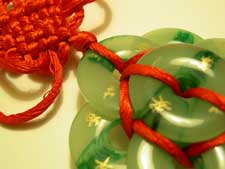Good Qi, Bad Qi
Good Qi circulating freely throughout your body will only take you so far if distracting or destructive Qi fills your home or office. Buildings carry energy, just as people do. Occupants enjoy a sense of protection and harmony when that energy is good, but when it’s bad, an aura of confusion, discord or plain bad luck can manifest. A variety of different factors can cause bad Qi. Some are easier to correct than others. Clutter, improper positioning of furniture and poor use of color are easy fixes. The same cannot be said for the history associated with a site, architectural flaws, and conflicts that arise when a property or floor plan is out of synch with your personal direction and/or natural element.
Feng Shui: Acupuncture for the Home
Clearing your desktop of clutter can instantly improve efficiency. Dining by candlelight really seems to make food taste better. The space around you impacts the way you perceive and interact with the world on any given day. Small changes in your surroundings can lift your spirits and improve your entire outlook. Just as the well-placed acupuncture needle helps balance the flow of life-nourishing Qi throughout the body, Feng Shui strategies correct imbalances in the energy around you, allowing you to experience your environment at a more harmonious frequency, repel negativity and attract that which you desire.
Frequently described as “the art of placement,” Feng Shui is actually a science drawn from the principles of astronomy, astrology and geomagnetism. There are numerous articles and books on Feng Shui that describe how certain color schemes and elementary good housekeeping improve the flow of Qi. This information, though valid, is somewhat generic. If you are serious about improving your personal circumstances by manipulating Qi, you should enlist the help of a formally trained Feng Shui practitioner who is well versed in the philosophy behind the science and understands how to use the tools of the trade to analyze and improve your unique set of circumstances.
A Vibrational Healing Arts Feng Shui Consult
Calculating the energy “blueprint,” of a space requires knowledge of the Taoist’s I-Ching, Yin-Yang principles, the Eight Trigrams and proper use of a Ba Gua map. The goal is to discover how a space’s energy characteristics affect its occupants and then determine what changes are necessary to remedy those conflicts that are impeding good Qi. All this requires a rather complicated assessment of the physical relationship between the natural environment and the Earth’s magnetic fields.
As a Feng Shui practitioner who employs good intuition and techniques from the Ba Gua, Fire Element, Compass Style and Black Hat schools of Feng Shui, Jackie can help you:
- Choose the best parcel of land for building a home or office and determine the most appropriate floor plan for the new structure.
- Select and/or adjust decor in your existing structure to improve a host of life circumstances, ranging from romance to finance.
- Understand now time and circumstances can leave positive or negative imprints on places and things, and ways to deal with this phenomena
- Incorporate Yin-Yang principles into your space for improved balance, proportion and continuity
- Let go of clutter
- Trust in your own design intuition
- Understand the “law of attraction,” and how the environment you create will mirror your life’s experiences and opportunities
Feng Shui History
Developed 4,000 years ago by astronomers and meteorologists employed by the Imperial Dynasties, Feng Shui (pronounced “fung shway”) was originally intended strictly as a device for ensuring the continued power, prosperity and happiness of the royal families. For generations it remained shrouded in secrecy, but Feng Shui, which literally translates to “wind and water,” was ultimately passed down from its original masters to carefully selected protégés.
The practice spread to tiny seaside villages and throughout the Orient, where it was used to determine the most auspicious locations for crucial structures and objects (such as crops, temples, dwellings and burial sites). Weather patterns, terrain, cosmology, mysticism and geomagnetic pull all factored in to the Feng Shui philosophy, which taught that Qi—the invisible energy force that permeates and connects all things—has the capacity to attack or support.


